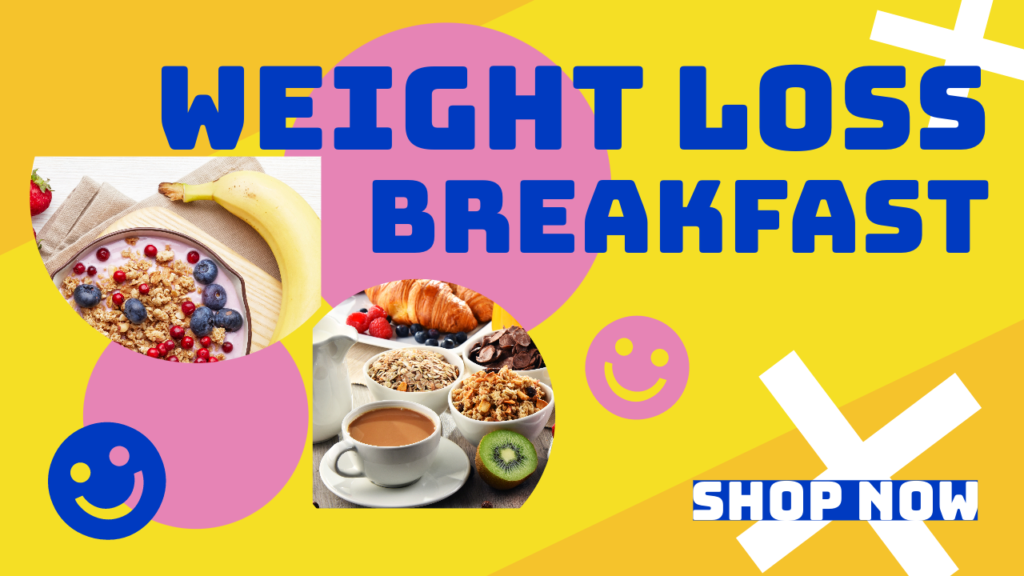Are you looking to shed those extra pounds and kickstart your weight loss journey? One of the essential aspects of any successful weight loss plan is a healthy and nutritious breakfast. A well-balanced breakfast not only provides you with the energy to kickstart your day but also sets the tone for healthy eating habits throughout the day. In this comprehensive guide, we will explore a variety of weight loss breakfast ideas and create a diet plan that will help you achieve your weight loss goals.

Why is Breakfast Important for Weight Loss?
Breakfast is often referred to as the most important meal of the day, and for good reason. Research has shown that individuals who regularly consume breakfast are more likely to maintain a healthy weight and make better food choices throughout the day. Skipping breakfast can lead to overeating later in the day, making it harder to manage your calorie intake and achieve weight loss goals.
Additionally, breakfast provides you with the necessary nutrients and energy to fuel your body and kickstart your metabolism. By breaking your overnight fast, you can rev up your metabolism and promote fat burning throughout the day. Therefore, incorporating a healthy and balanced breakfast into your weight loss plan is crucial.
Effect of Breakfast Skipping
Breakfast has long been hailed as the most important meal of the day, and for good reason. Numerous epidemiological studies have suggested a link between skipping breakfast and negative health outcomes, such as weight gain, insulin resistance, and even type 2 diabetes.
One important factor to consider is the timing of our meals. When we eat, our bodies experience a postprandial increase in energy expenditure and blood glucose levels. This means that skipping breakfast can disrupt this natural rhythm and have a negative impact on our overall energy metabolism.
A study conducted to evaluate the effect of breakfast skipping on diurnal variation of energy metabolism and blood glucose levels found some interesting results. In this study, participants were randomly assigned to either skip breakfast or have a regular breakfast. Those who skipped breakfast compensated by consuming larger meals at lunch and supper.
The findings of this study revealed that skipping breakfast led to a reduction in 24-hour energy expenditure, meaning that overall calorie burn throughout the day was lower for those who skipped breakfast. Additionally, skipping breakfast was found to elevate blood glucose levels.
These results suggest that breakfast skipping can have a detrimental effect on both energy metabolism and blood glucose regulation. By missing out on this crucial meal in the morning, our bodies may not be able to efficiently burn calories throughout the day, leading to potential weight gain over time. Moreover, elevated blood glucose levels are associated with insulin resistance and an increased risk of developing type 2 diabetes.
Long-Term Effects of Skipping
It’s important to note that this study was conducted in a controlled environment with a relatively small number of participants. While the results are intriguing, further research is needed to fully understand the long-term effects of breakfast skipping on our health.
So, if you find yourself frequently skipping breakfast, it may be worth considering the potential consequences. Making time for a balanced meal in the morning can help kickstart your metabolism, provide you with essential nutrients, and regulate your blood sugar levels. Remember that breakfast doesn’t have to be elaborate – even a simple bowl of oatmeal or a piece of fruit can make a difference.
Particularly, epidemiological studies suggest that there is an association between breakfast skipping and negative health outcomes such as weight gain, insulin resistance, and type 2 diabetes. The timing of our meals affects our energy metabolism and blood glucose regulation, and skipping breakfast can disrupt this delicate balance. While more research is needed, it’s advisable to prioritize a nutritious breakfast to support overall health and well-being.
Breakfast and Fat Oxidation
Breakfast and its impact on fat oxidation is a topic that has been widely debated in the health and fitness community. Many people believe that eating breakfast is essential for kickstarting your metabolism and promoting fat burning throughout the day. However, recent research has shed some light on this matter and provided us with valuable insights.
In a study conducted using a randomized repeated-measure design, eight males were asked to stay in a room-size respiratory chamber. The participants underwent two different conditions – one with breakfast and one without breakfast. The researchers measured various parameters such as 24-hour energy expenditure, fat oxidation, thermic effect of food, and blood glucose levels.
Surprisingly, the study found that skipping breakfast did not have any significant effect on 24-hour energy expenditure, fat oxidation, or thermic effect of food. This means that whether you eat breakfast or not, it does not seem to directly impact your body’s ability to burn fat or increase your overall calorie expenditure throughout the day.
Skipping and Blood Glucose Levels
However, there was one interesting finding from the study – breakfast skipping led to an increase in the overall 24-hour average of blood glucose levels. The participants who skipped breakfast had higher blood glucose levels compared to those who had breakfast. This increase in blood glucose levels was statistically significant.
These findings suggest that changes in glucose homeostasis precede changes in energy balance when it comes to the impact of breakfast on fat oxidation. In other words, skipping breakfast may have an effect on your blood glucose levels but does not seem to directly influence fat burning or energy expenditure.
It is important to note that this study was conducted on a small group of male participants and may not be representative of the entire population. Additionally, individual differences in metabolism and other factors can also play a role in how breakfast affects fat oxidation.
Energized and Satisfied
So, what does this mean for you? If you are someone who enjoys eating breakfast and feels energized and satisfied after a morning meal, there is no need to change your routine based solely on the belief that it will enhance fat burning. On the other hand, if you prefer to skip breakfast or find that it doesn’t fit your lifestyle, you can rest assured knowing that it is unlikely to have a significant impact on your body’s ability to burn fat.
As with any dietary decision, it is important to listen to your body and make choices that align with your individual needs and preferences. If you have specific health concerns or goals, it is always advisable to consult with a healthcare professional or registered dietitian who can provide personalized advice based on your unique circumstances.
Regardless, while breakfast skipping may affect blood glucose levels, it does not appear to directly influence fat oxidation or energy expenditure. Ultimately, the decision to eat or skip breakfast should be based on your personal preferences and goals.
The Role of Macronutrients in a Weight Loss Breakfast
When planning a weight loss breakfast, it’s essential to focus on the right balance of macronutrients. Macronutrients, including carbohydrates, proteins, and fats, play a vital role in providing energy, promoting satiety, and supporting various bodily functions. Here’s a breakdown of how each macronutrient contributes to a weight loss breakfast:
1. Carbohydrates
Carbohydrates are the body’s primary source of energy and should be included in a balanced breakfast. However, not all carbohydrates are created equal. Opt for complex carbohydrates such as whole grains, fruits, and vegetables, which provide fiber and essential nutrients while keeping you fuller for longer. Avoid refined carbohydrates like white bread and sugary cereals, as they can spike blood sugar levels and lead to energy crashes later in the day.
2. Proteins
Protein is a crucial macronutrient for weight loss as it promotes satiety, helps build and repair tissues, and supports muscle growth. Including a good source of protein in your breakfast can help you feel fuller for longer and prevent overeating later in the day. Excellent protein sources for breakfast include eggs, Greek yogurt, cottage cheese, and plant-based options like tofu or protein powder.
3. Fats
Contrary to popular belief, not all fats are bad for weight loss. Healthy fats, such as those found in avocados, nuts, seeds, and olive oil, are essential for nutrient absorption, hormone production, and satiety. Including a small amount of healthy fats in your breakfast can help you feel satisfied and prevent cravings throughout the day.
Sustain Weight Loss
When it comes to sustaining weight loss, selecting the right breakfast foods is crucial. Whether you’re following a specific dietary program or not, there are three important considerations that should be included in every healthy breakfast.
First and foremost, high protein foods should be a priority. Including foods such as eggs, meat, or dairy products can help keep you feeling full and satisfied throughout the morning. Protein is known to increase satiety and reduce appetite, which can ultimately help with weight management.
Secondly, complex carbohydrates with high fiber should be on your breakfast menu. Whole grains, such as oats or whole wheat bread, are excellent choices as they provide a steady release of energy and keep you feeling full for longer periods of time. Fresh fruits are also a great source of complex carbohydrates and fiber, providing essential nutrients while adding a touch of sweetness to your breakfast.
Lastly, don’t forget about calcium. Including calcium-rich or calcium-fortified cereals, juices, or dairy products in your breakfast can help support bone health and contribute to a balanced diet. Calcium is essential for maintaining overall health and can be particularly beneficial for women who are at a higher risk of osteoporosis.
Overall Healthy Eating
It’s important to note that these considerations should be part of an overall healthy eating approach. While breakfast is an excellent opportunity to start your day off right, it’s equally important to focus on making nutritious choices throughout the rest of the day as well.
Specifically, when it comes to sustaining weight loss, selecting the right breakfast foods is key. Incorporating high protein foods, complex carbohydrates with high fiber, and calcium-rich options into your morning routine can contribute to a healthy and balanced diet. Remember to make mindful choices throughout the day to support your weight loss goals and overall well-being.
Breakfast and Exercise
Breakfast and exercise are two important factors that can significantly impact our metabolism, appetite, and macronutrient balance. A recent study aimed to investigate the effects of breakfast and exercise on postprandial metabolism and appetite.
The study found that appetite following the test drink was reduced in individuals who had breakfast compared to those who skipped it. Similarly, appetite was also reduced in individuals who exercised before the test drink compared to those who didn’t. These findings suggest that both breakfast and exercise can help to suppress appetite, which may be beneficial for individuals trying to manage their weight or control their food intake.
Furthermore, the study also looked at energy balance after lunch. It was observed that individuals who had breakfast had a more positive energy balance compared to those who skipped it. On the other hand, individuals who exercised before the test drink had a less positive energy balance after lunch compared to those who didn’t exercise. This suggests that both breakfast and exercise can impact our energy balance, with breakfast leading to a higher energy intake and exercise leading to a lower energy intake.
Interestingly, regardless of whether breakfast was consumed or not, acute exercise still produced a less positive energy balance after lunch. This implies that exercise has the potential to offset some of the excess energy consumed during a meal, regardless of whether breakfast was eaten or skipped. This finding highlights the importance of regular physical activity in maintaining a healthy energy balance.
Reduced Energy and Fat Balance
Additionally, the study also found that breakfast omission further reduced energy and fat balance. This indicates that skipping breakfast may not only lead to a lower energy intake but also have an impact on the utilization of stored fats for energy.
Moreover, breakfast was found to improve overall appetite responses to foods consumed later in the day. This means that having breakfast can enhance our satisfaction and enjoyment of meals consumed later on, potentially leading to better food choices and portion control.
Significantly, this study provides valuable insights into the effects of breakfast and exercise on postprandial metabolism, appetite, and macronutrient balance. It suggests that both breakfast and exercise can play a role in managing appetite, energy balance, and overall food intake. Therefore, incorporating a nutritious breakfast into your daily routine and engaging in regular physical activity can contribute to overall health and well-being.
Weight Loss Breakfast Ideas
Now that we understand the importance of breakfast for weight loss and the role of macronutrients, let’s dive into some delicious and nutritious weight loss breakfast ideas.
When it comes to weight loss, breakfast is often considered the most important meal of the day. Not only does it kickstart your metabolism, but it also helps you stay full and satisfied throughout the day, preventing unnecessary snacking or overeating. So if you’re looking for some weight loss breakfast ideas, you’ve come to the right place!
Before we dive into the ideas, let’s take a look at a recent study conducted in the UK. The aim of the study was to explore breakfasting habits and beliefs among adults, as well as their relationship with measures of personality, health, and wellbeing. The findings of this survey revealed some interesting insights.
Firstly, the study found that breakfast eaters strongly believe that having breakfast helps with weight control and weight loss. This aligns with the common belief that starting your day with a nutritious meal can set a positive tone for the rest of the day.
Furthermore, breakfast eaters were more likely to engage in vigorous exercise compared to those who skipped breakfast. This suggests that individuals who prioritize breakfast also tend to prioritize their overall health and fitness goals.
However, it’s worth noting that the study did not find a significant difference in BMI (body mass index) between breakfast eaters and those who skipped breakfast. This suggests that while breakfast may have its benefits, it may not be the sole determining factor in weight loss.
Breakfast Habits and Weight Loss
Now that we have a better understanding of the relationship between breakfast habits and weight loss, let’s explore some weight loss breakfast ideas:
- Protein-packed omelette: Start your day with a filling and nutritious omelette loaded with veggies like spinach, bell peppers, and mushrooms. Add a sprinkle of low-fat cheese for an extra flavor boost.
- Overnight oats: Prepare a batch of overnight oats by combining rolled oats, milk (or your preferred plant-based alternative), and your choice of toppings such as berries, nuts, or a dollop of nut butter. Leave it in the fridge overnight, and wake up to a delicious and fiber-rich breakfast.
- Greek yogurt parfait: Layer Greek yogurt with fresh fruits like berries and sliced bananas in a glass or bowl. Top it off with a sprinkle of granola for added crunch.
- Avocado toast: Mash half an avocado onto a slice of whole-grain toast and season it with salt, pepper, and a squeeze of lemon juice. For an extra protein boost, add a poached egg on top.
- Smoothie bowl: Blend together a mix of frozen fruits like bananas, berries, and spinach with your choice of liquid (milk or plant-based alternative). Pour it into a bowl and top it with your favorite toppings such as chia seeds, granola, or sliced almonds.
Ideas to Get Started
Remember, these are just some ideas to get you started. It’s important to choose breakfast options that align with your taste preferences and dietary needs. Additionally, incorporating other healthy lifestyle habits such as regular exercise and mindful eating will further support your weight loss journey.
Subsequently, while having breakfast can be beneficial for weight control and weight loss, it is not a magic solution on its own. The key is to choose nutrient-dense options that provide sustained energy throughout the day. So go ahead and start your day off right with a healthy and satisfying breakfast!
1. Veggie Omelette

Ingredients:
- 2 eggs
- Assorted vegetables (spinach, bell peppers, onions, mushrooms)
- 1 tablespoon olive oil
- Salt and pepper to taste
Instructions:
- Heat olive oil in a non-stick pan.
- Add the chopped vegetables and sauté until tender.
- In a separate bowl, whisk the eggs and season with salt and pepper.
- Pour the egg mixture over the vegetables and cook until the omelette is set.
- Flip the omelette and cook for another minute.
- Serve hot with a side of whole grain toast or fresh fruit.
2. Greek Yogurt Parfait

Ingredients:
- 1 cup Greek yogurt
- 1/2 cup mixed berries
- 2 tablespoons granola
- 1 tablespoon honey (optional)
Instructions:
- In a glass or bowl, layer Greek yogurt, mixed berries, and granola.
- Drizzle honey on top for added sweetness if desired.
- Repeat the layers until all ingredients are used.
- Enjoy as a refreshing and protein-packed breakfast.
3. Overnight Chia Pudding

Ingredients:
- 2 tablespoons chia seeds
- 1 cup unsweetened almond milk
- 1 tablespoon honey or maple syrup
- Fresh fruits or nuts for topping
Instructions:
- In a jar or container, mix chia seeds, almond milk, and sweetener.
- Stir well and let it sit in the refrigerator overnight.
- In the morning, give it a good stir and top with fresh fruits or nuts.
- Enjoy a creamy and nutritious chia pudding for breakfast.
4. Whole Grain Toast with Avocado and Egg

Ingredients:
- 1 slice of whole grain bread
- 1/2 avocado, mashed
- 1 poached or boiled egg
- Salt, pepper, and chili flakes to taste
Instructions:
- Toast the whole grain bread until golden brown.
- Spread the mashed avocado on top of the toast.
- Top with a poached or boiled egg.
- Sprinkle salt, pepper, and chili flakes for added flavor.
- Enjoy a satisfying and nutrient-packed avocado toast breakfast.
5. Green Smoothie

Ingredients:
- 1 cup spinach or kale
- 1 ripe banana
- 1/2 cup unsweetened almond milk
- 1 tablespoon nut butter (almond, peanut, or cashew)
- 1 tablespoon chia seeds
- Ice cubes (optional)
Instructions:
- In a blender, add spinach or kale, banana, almond milk, nut butter, and chia seeds.
- Blend until smooth and creamy.
- Add ice cubes if desired for a refreshing smoothie.
- Pour into a glass and enjoy a nutrient-packed green smoothie.
These are just a few examples of delicious and nutritious weight loss breakfast ideas. Feel free to get creative and customize these recipes to suit your taste preferences and dietary needs. Remember to focus on the right balance of macronutrients and choose whole, unprocessed ingredients for optimal health and weight loss.
Creating a Weight Loss Breakfast Diet Plan
To maximize your weight loss efforts, it’s important to create a well-rounded and balanced diet plan that incorporates healthy breakfast options. Here’s a sample weight loss breakfast diet plan to get you started:
Day 1:
- Veggie omelette with whole grain toast
- Greek yogurt parfait with mixed berries
- Green smoothie with spinach, banana, and almond milk
Day 2:
- Overnight chia pudding with almond milk and fresh fruits
- Avocado toast with poached or boiled egg
- Mixed fruit salad with a sprinkle of chia seeds
Day 3:
- Whole grain oatmeal topped with sliced almonds and berries
- Scrambled eggs with sautéed vegetables
- Protein-packed smoothie with Greek yogurt, whey protein, and spinach
Day 4:
- Quinoa breakfast bowl with roasted vegetables and a poached egg
- Cottage cheese with sliced peaches and a drizzle of honey
- Green tea and a handful of nuts for a mid-morning snack
Day 5:
- Whole grain pancakes topped with fresh fruits and a dollop of Greek yogurt
- Smoked salmon and cream cheese bagel thin
- Turmeric-infused golden milk for an anti-inflammatory boost
Remember to listen to your body’s hunger and fullness cues and adjust portion sizes accordingly. Incorporate a variety of nutrient-dense foods and stay hydrated throughout the day. Regular physical activity and a balanced diet are essential for sustainable weight loss.
Conclusion
Incorporating a healthy and balanced breakfast into your weight loss plan can set you up for success. By focusing on the right balance of macronutrients and choosing nutrient-dense ingredients, you can create delicious and satisfying weight loss breakfasts. Remember to customize these ideas to suit your taste preferences and dietary needs. Combine these breakfast options with a well-rounded diet plan and regular physical activity for optimal weight loss results. Start your day right with a nutritious breakfast and embark on your journey towards a healthier you.
Disclaimer: Before starting any weight loss or diet plan, it’s important to consult with a healthcare professional or registered dietitian to ensure it is appropriate for your individual needs and health conditions.
References
Effect of breakfast skipping on diurnal variation of energy metabolism and blood glucose Author links open overlay panel https://doi.org/10.1016/j.orcp.2013.01.001
Gonzalez JT, Veasey RC, Rumbold PLS, Stevenson EJ. Breakfast and exercise contingently affect postprandial metabolism and energy balance in physically active males. British Journal of Nutrition. 2013;110(4):721-732. doi:10.1017/S0007114512005582
Express Speak Kathy Sitzman , MS, RN Eating Breakfast Helps Sustain Weight Loss https://journals.sagepub.com/doi/pdf/10.1177/216507990605400307
Breakfast habits, beliefs and measures of health and wellbeing in a nationally representative UK sample https://doi.org/10.1016/j.appet.2012.09.024



